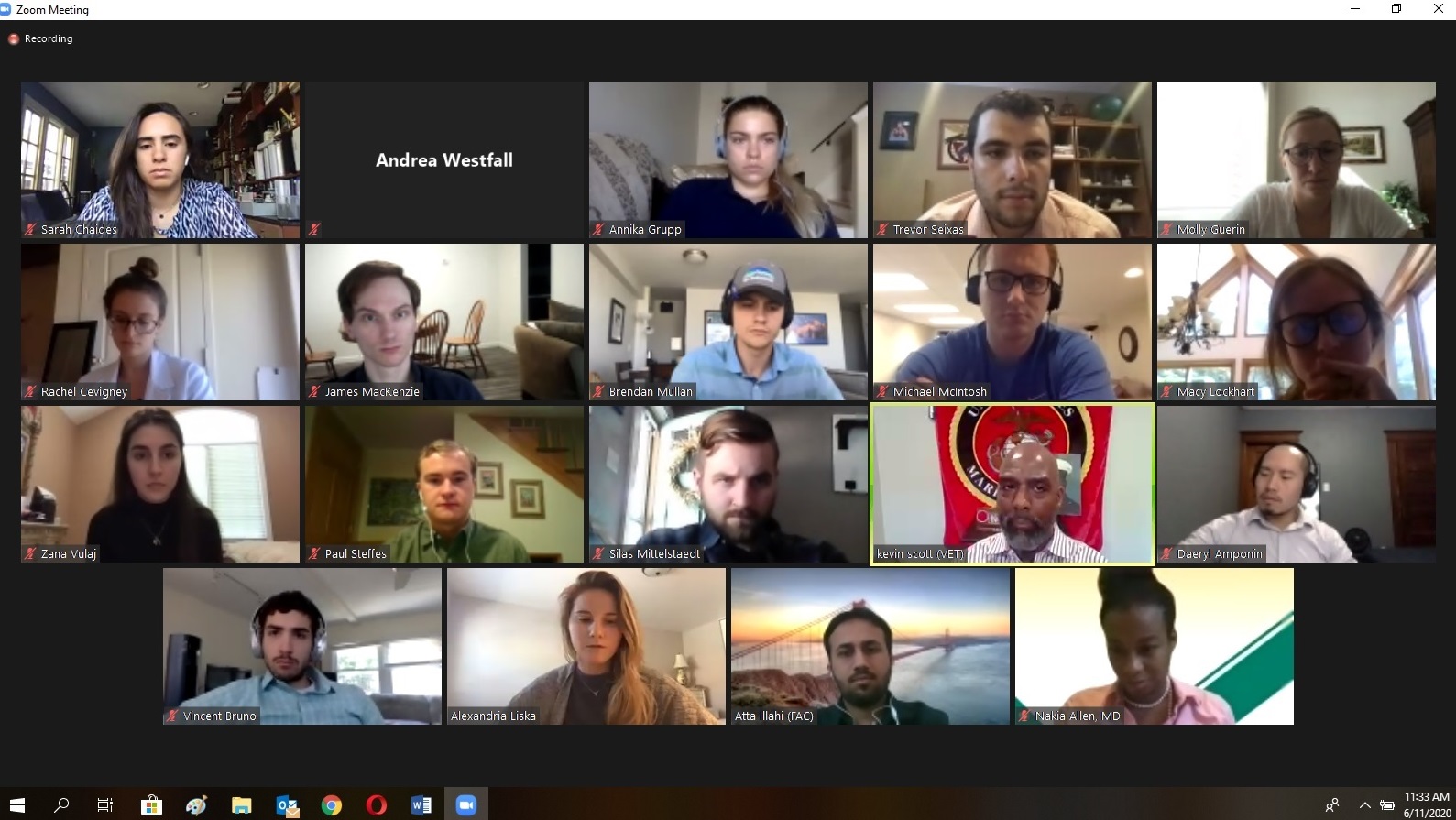
A new class of Wayne State University physicians-in-training met with a panel of veterans to hear their experiences with both civilian and government-provided health care.
Unlike last year, the Class of 2023 met the veterans virtually June 11, utilizing Zoom to break into learning groups of 30 as part of the School of Medicine’s Population, Patient, Physician and Professionalism Course directed by Associate Professor of Pediatrics Nakia Allen, M.D. The goal of the event was to ensure students continue to understand the social and economic impacts of health care on veterans.
Medical student and United States Navy Reserve Ensign Claire Novelly was among the attendees.
“I was very happy to see veterans’ health included as a unit in our P4 curriculum. I am attending medical school on a Navy scholarship through the Health Professions Scholarship Program, so I will serve as a military physician after I graduate,” she said. “I often feel like my medical education and my military service are two separate entities right now, so it was nice to merge the two together for this unit.”
Novelly joined the military to provide the best possible health care to veterans, and service members and their families.
“I always knew I would interact with this subset of the population, but I’m glad that I got to do it this early in my medical training, and I'm even happier that my fellow classmates and other future professionals got to learn about the importance of veterans’ health care alongside me,” she added. “I am glad we got to meet the veterans virtually as opposed to not at all, but I do wish I could have personally looked them in the eye, shaken their hands, thanked them for their service and told them I’m honored to serve in the military with them. However, I think it is incredible that Wayne State was able to recruit such a wide variety of veterans who were willing to take on the technology barriers and share their stories with us. I think that speaks to how important their message is and how eager they are for us future health care professionals to hear it.”
Vietnam War veteran Ed Ruckle was among the 15 veterans who participated. He served in the U.S. Navy from 1966 to 1972, flying fighter jets and performing electronic reconnaissance. He has a partial disability due to exposure to the defoliant Agent Orange, and utilizes the Detroit VA Medical Center as well as civilian health care.
“I think some of the students will find out something about the VA that they did not know before. I think it’s an educational thing for them to find out what the VA does,” he said.
Student questions ranged from how the VA takes care of homeless vets to how COVID-19 has changed the way the VA cares for veterans and how it’s utilizing technology during the pandemic.
Students from other health care-focused units at Wayne State also participated, including Warren Rinas, a student in the School of Social Work.
“Listening to the veterans’ deeply felt experiences was very interesting. Hearing how the veterans were conditioned to take the pain and to keep on going on made it clear why trauma could be long lasting and how it could go unnoticed by friends and family. I encourage anyone who is interested in broadening their perspective to take part in such a session with an open mind,” Rinas said.
The veterans’ panel was added to the School of Social Work SW 1010 Introduction to Social Work and Social Welfare course as a class field study option, said Shantalea Johns, Ed.D., LMSW, an academic services officer and adjunct professor of Social Work.
“Regardless of the practice area, chances are that nearly all social workers will serve veterans in some capacity, whether through mental and behavioral health therapy, social services, housing, health care, care coordination or a variety of other services. This unit, therefore, provided social work students an opportunity to make the connection between positive health outcomes and collaboration between disciplines,” Dr. Johns said.
The panelists shared their personal stories and experiences through a series of questions asked by the students and moderators, and identified strengths and assets that they and their family members have. Some also discussed the barriers and challenges they faced or continue to face in reintegrating into civilian life, work and school.
“The veterans are an inspiration and a personal reminder of why I decided to enter the field of medicine, which is something I think many of us need from time to time, especially during COVID-19,” Novelly said.